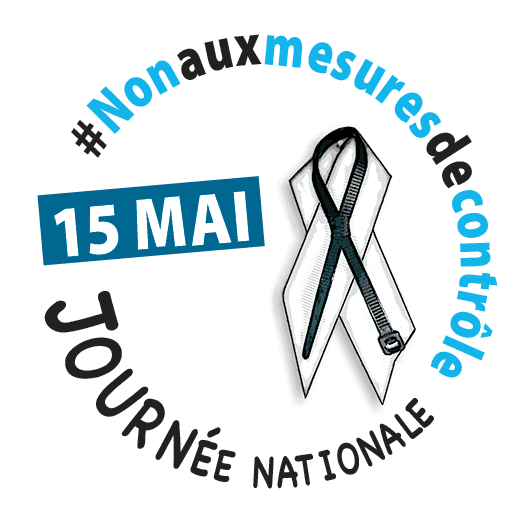May 15: Journée nationale
« Non aux mesures de contrôle : isolement, contention physique et substances chimiques »

May 15, 2023 is the 8th annual Journée Nationale Non aux mesures de contrôle : isolement, contention et substances chimiques
May 15 is nearly upon us! This year, the CDDM will mark our national day of “no” to control measures with local awareness-raising activities in public spaces that use the power of art to get the message across!
Art at the service of politics
Ever heard the term socially engaged art? Traditionally seen as a form of protest or activist art made by a given artist or collective, socially engaged art is a rallying tool that evokes emotion and dialogue in a bid to catalyze political and/or social change.

Q: What does the CDDM mainly advocate regarding the use of control interventions (i.e., confinement and/or physical or chemical restraints) in Québec?
A: We advocate for the implementation and use of alternative, practicable and very real methods! These methods are contrary to confinement and restraint, essentially a form of violence that undermines personal dignity and integrity. Don’t forget that, in Québec, control measures can used on people of all ages and in a range of institutional settings.
Our approach for 2023
Our idea is to create mobiles or design objects that suggest confinement and restrain; these can be hung in different public places (e.g. parks). A laminated text presenting our views and proposing alternative measures will also be displayed near each artwork. For the moment, our plan is to hold our symbolic action on Friday, May 12 and take down our objects on May 15.
How can I get involved?
We welcome your ideas or proposals for objects that can symbolize confinement and/or mechanical and chemical restraints (or their effects).
Better yet, if you want to help design these items, call your local counsellor.
Best of all, get involved in our local actions!
The CDDM Mobilization Committee
A summary of the CDDM’s claims
We, the Collectif de défense des droits de la Montérégie, member of the AGIDD-SMQ, hereby demand:
- That control interventions such as confinement and physical or chemical restraint be eliminated and replaced by preventive and alternative measures based on the respect for human rights. These include listening to the individual in question, being informed about their lifestyle, understanding their medication and its side effects, taking into account physical conditions, establishing bonds of trust and working to ensure better communication;
- That therapeutic approaches based on social, environmental, cultural, spiritual, athletic and other activities be implemented;
- That the individual in question be actively involved in all decisions that concern them;
- That legal instruments be respected and the exercise of individual rights, strengthened the right to information, the right to receive support, the right to participate in one’s own treatment plan;
- That general, ongoing training be developed and provided to health professionals about how control interventions affect those who have been subject to them, as well as on the means of eliminating such measures as confinement and physical or chemical restraint.
- In parallel, the CDDM asks that each CISSS (integrated health and social services centre) create a committee whose mandate is to implement alternatives to control interventions.
- We also look to our elected officials for action and leadership in demanding that the Ministère de la santé et des services sociaux observe its past commitments.

